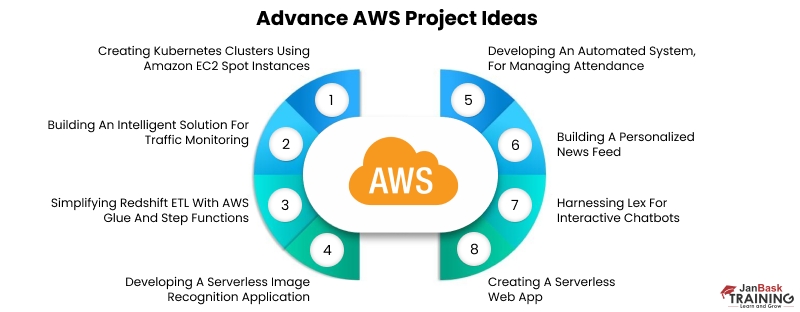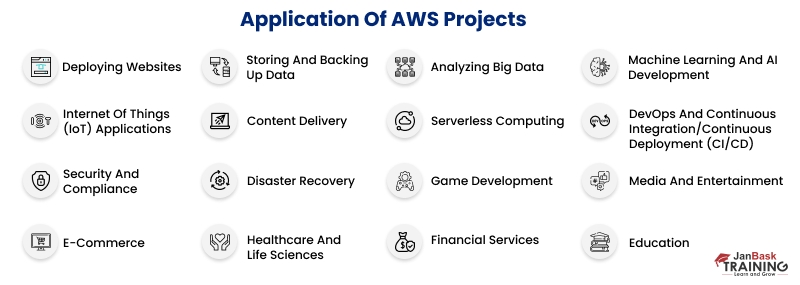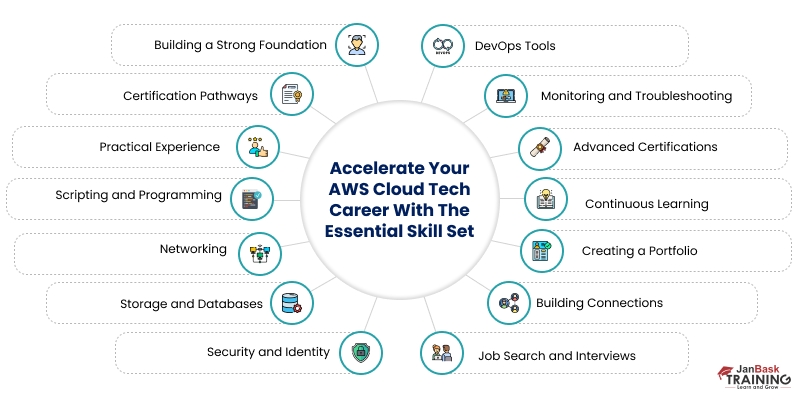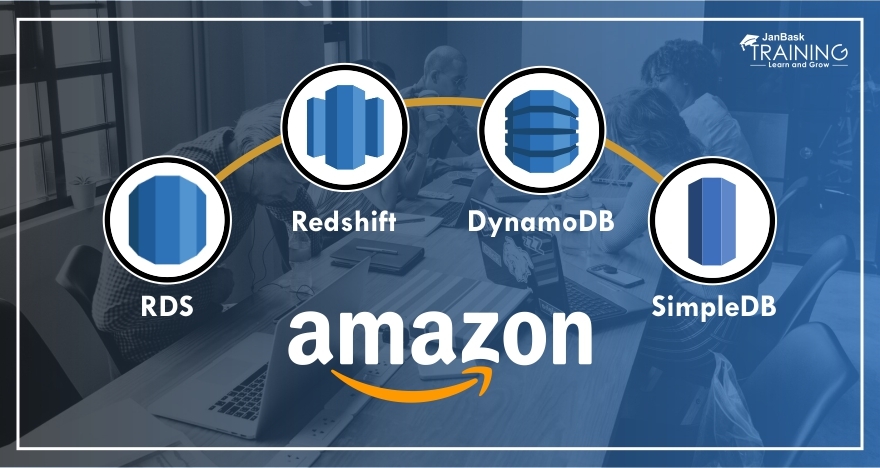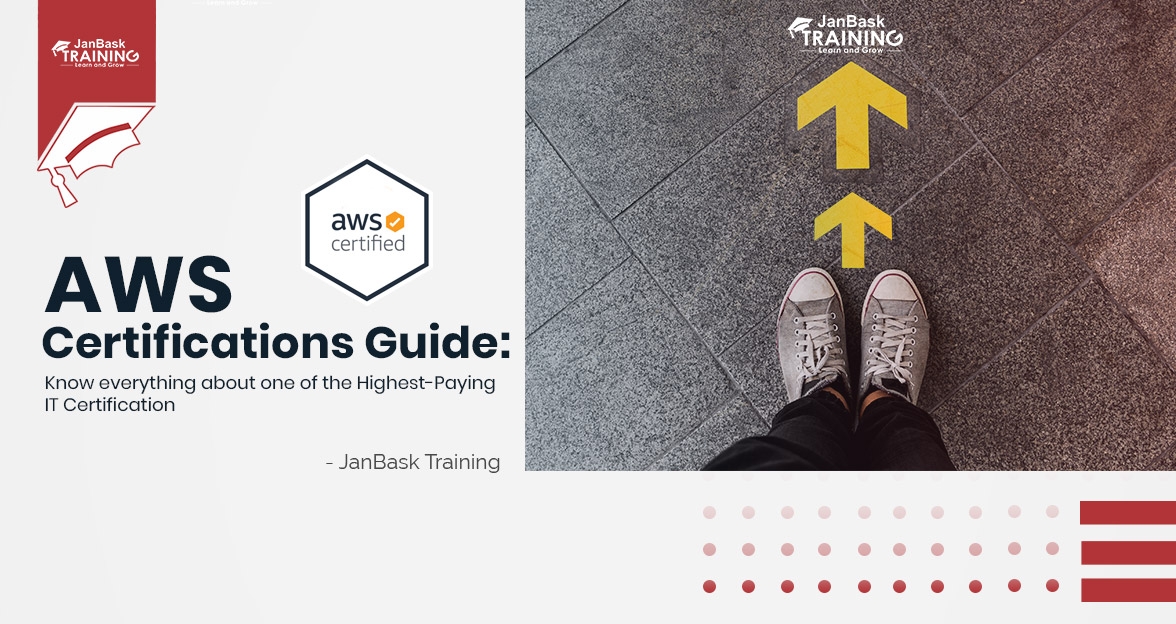Introduction
Building a strong portfolio is crucial for anyone looking to advance their career in cloud computing, and having relevant AWS projects for portfolio is a great way to demonstrate your skills to potential employers. Engaging in AWS portfolio projects not only helps you gain practical experience but also shows your ability to work with real-world cloud solutions. For beginners, starting with AWS sample projects for beginners is a fantastic way to familiarize yourself with the core AWS services and gradually build more complex projects. By incorporating trending and in-demand projects into your portfolio, you can significantly enhance your chances of standing out in the competitive job market. Whether you're aiming to develop expertise or simply enhance your skills, AWS projects are an essential step toward success.
AWS Solution Architect Training and Certification
- No cost for a Demo Class
- Industry Expert as your Trainer
- Available as per your schedule
- Customer Support Available
What is AWS?
Amazon Web Services (AWS) is Amazon's cloud computing platform that offers a range of services including Platform, as a Service (PaaS) Infrastructure as a Service (IaaS), and Software as a Service (SaaS). It provides businesses with resources like database storage, computational power, and seamless content distribution.
In 2006 AWS was introduced as an extension of Amazon. coms infrastructure to meet the growing needs of their retail operations. It revolutionized the cloud computing industry by introducing the pay, as you go model, which allows users to dynamically scale their resources based on storage, computation, and throughput requirements.

Today AWS serves a range of clients worldwide. Its solutions and tools are utilized by enterprises, software developers, educational institutions, government agencies, private companies, and charitable organizations. AWS operates through data centers located across the globe. To learn more about AWS, check out this AWS solution architect training.
AWS Projects: Why Should You Work On It
In a fiercely competitive task market, merely possessing theoretical information about AWS won't suffice. So, what role do AWS cloud initiatives play in this state of affairs? While you dive right into a medley of real-time AWS projects, you gain valuable insights into employing AWS offerings in actual international eventualities while also acquainting yourself with the demanding situations that unavoidably get up on this dynamic platform.
These tasks equip you with the capacity to assemble scalable and dependable packages, master infrastructure management through automation tools, and engineer fee-effective, green solutions. Incorporating real-time AWS initiatives into your resume dramatically complements your odds of securing interviews and employment. Furthermore, these initiatives function as a replica, reflecting areas in want of development, enabling you to reinforce your AWS abilities and ascend to the rank of a professional in this realm.
Best AWS Projects For Beginners
Are you an aspiring professional planning to transition to AWS? Are you looking for the best
AWS projects for portfolio for beginners? If yes, this guide will help you land your dream job and achieve your desired package. Students or experts new to AWS can start with an AWS tutorial for beginners. Final-year students can take up those AWS actual-time tasks for exercise. Continue reading this blog to get valuable insights on AWS project ideas.
1. Mass Emailing Using AWS Lambda
Amazon Web Services (AWS) is a leading player in cloud technology, making it a valuable skill to possess in today's landscape. By engaging in AWS projects, you can gain experience with cutting-edge cloud services and infrastructure. Moreover, undertaking top AWS certifications and project work can significantly boost your career prospects as the demand for cloud professionals grows.
Furthermore, AWS projects offer real-world challenges that allow you to build applications and optimize resource management, fostering your skills and problem-solving abilities. Ultimately, working on AWS projects not only opens career opportunities but also equips you with the knowledge and expertise needed to succeed in a future increasingly centered around cloud technology. For example, you could implement a serverless web application using AWS Lambda and API Gateway. This is an example of an AWS project for beginners.
2. Identifying People With Amazon Recognition
The goal of this task is to use Amazon Recognition for identifying individuals. We will be utilizing Amazon Recognition, which combines computer vision, machine learning and artificial intelligence (AI) principles. Before starting the project it's important to have an understanding of computer vision concepts and associated algorithms.
For this project your responsibility will be to develop a face recognition model that accurately identifies individuals in photos or images. Training a face recognition model can be time consuming and tiring. Aws Lambda simplifies the process and makes it more manageable.
To successfully carry out this project we need to utilize Amazon Recognition for conducting face recognition. This software automatically extracts metadata from image and video files. Uses learning techniques to identify objects, faces and text within them. In order to make progress in this project you'll need to train your model to accurately recognize a known individual. Once you've spent time training your model with data you can test its performance. To improve your models performance further consider adding individuals data during training.
3. Creating a Text-To-Speech Converter
The development process of a text to speech converter involves creating a tool that uses AI to convert written text into words. Many websites and web applications utilize this feature extensively. One effective approach is to utilize AWS Lambda and Amazon Polly, which combine to provide speech synthesis capabilities. Amazon Polly employs learning techniques for precise conversions while AWS Lambda enhances response times, which is crucial for real time applications.
4. Content Recommendation System
A content recommendation system is a technology that suggests content to users based on their preferences and browsing behavior. It analyzes user data. Employs algorithms to match users with content that they are likely to enjoy. Almost all streaming platforms such, as Netflix, Amazon Prime Video and others incorporate content recommendation systems. To implement this project you can leverage the power of AWS cloud and nearest neighbor algorithms. This is a good AWS project for beginners because it does not require any prior experience with machine learning.
To simplify the implementation of machine learning in this project it is recommended to use Amazon SageMaker as it provides user features that streamline the process.
The software comes with built in algorithms that don't need labeled data. Moreover it uses search relying on string matching to make tasks more efficient. The combination of AWS and nearest neighbor algorithms ensures results and recommendations.
To grasp a better idea of this, check out these AWS developer classes.
5. Training A Machine Learning Model Using SageMaker
To train a machine learning model using SageMaker, follow these steps:
- Set up an Amazon SageMaker instance.
- Prepare your training data by cleaning and formatting it appropriately.
- Select the appropriate algorithm for your model.
- Configure the hyperparameters for your algorithm.
- Split your data into training and validation sets.
- Upload your training data to Amazon S3 SageMaker is a highly regarded machine learning service provided by Amazon.
The objective of this project is to utilize SageMaker for the purpose of training a machine learning model. The software offers a comprehensive development environment (IDE) for machine learning. Within this environment, you can effectively train your machine learning model using informative data. The Integrated Development Environment (IDE) provides users with the ability to create notebooks, easily navigate between different steps, verify outcomes, and perform additional functions. One of the advantages of using SageMaker is its ability to provide fast and efficient access to computer instances. To minimize the required effort, utilize the Autopilot feature of SageMaker to accomplish the task more efficiently.
6. Web Development Using AWS
The process of developing a website utilizing Amazon Web Services (AWS), the goal of this project is to create a website that is both secure and dependable. This will be achieved by utilizing AWS Lightsail as a virtual private server. You will gain hands-on experience with AWS by constructing a website that is directly linked to a database. Building a website can be made easier by utilizing AWS EC2 and Lambda services. These services offer SSD-based storage and come with pre configured web development features in Lightsail, which functions as a virtual private server.
This is one of the many projects on AWS that you can work on to gain hands-on experience with the platform and learn how to build secure and dependable websites.
7. Creating Personalized Alexa Skills
Objective of this Project: Replication of Alexa The goal of this project is to recreate Alexa and its abilities using AWS Lambda. This will involve using custom Alexa skill sets within the AWS Console to activate the handler function. Alternatively, you can also use the Alexa Handler function provided by AWS Lambda, along with custom logic, to call the handler function.
In this project, you have the option to utilize external third-party functions that are hosted outside of Alexa. From today onwards, you can perform tasks like playing music or setting reminders by giving commands for specific functions to execute those tasks. This is one of the best AWS cloud project ideas.
AWS Solution Architect Training and Certification
- Detailed Coverage
- Best-in-class Content
- Prepared by Industry leaders
- Latest Technology Covered
Intermediate AWS Projects With Source Code
1. AWS Athena Big Data Project for Querying COVID-19 Data
This is one of the projects on AWS that you can get involved in. It allows you to explore the Covid 19 dataset using AWS Athena, which's a serverless SQL query engine. The dataset contains a variety of timestamps, posts and comments related to Covid 19. This project gives you the opportunity to learn how to use Amazon Glue to create tables and gain hands-on experience with types of joins in Athena. With the help of Python you will create tables using crawlers in the AWS Glue Data Catalog.
Additionally while working on this project you will also understand how AWS Athena pricing works, which depends on the size of your files. Moreover this project involves AWS services such as Amazon S3 and Amazon CloudWatch. Amazon S3 allows you to securely store your dataset (CSV file) in S3 buckets, for processing while CloudWatch diligently monitors your data log files and enables analysis according to your needs.
2. Build an AWS ETL Data Pipeline in Python on YouTube Data
An AWS data pipeline, for YouTube data, built on Python and hosted on AWS is designed to handle and analyze types of data stored in a cloud based security Data Lake. This system categorizes the data into refined and analytical formats to enable analytics. The main focus of this project is to organize and analyze structured well as semi structured data from YouTube videos. Specifically it examines video genres. Trending statistics. The dataset comprises CSV files containing information, about daily trending YouTube videos over months.
Building an AWS ETL Data Pipeline in Python can be one of the good ideas for AWS projects.
3. Constructing an eCommerce Analytics Hub with AWS Services
Ecommerce analytics plays a role by gathering information from various factors that impact retail businesses. Analysts can use these insights to understand changes, in consumer behavior and online shopping trends. In this project, we will utilize an eCommerce dataset to create two pipelines: one for batch processing and another for real-time analysis.
These pipelines will be built using user activity logs, which include details about purchases, product views, cart interactions, and the digital journey of users on the platform. To accomplish this task we will integrate data ingestion through S3 perform data processing with Amazon Glue and utilize visualization tools from Amazon Kinesis. By leveraging AWS QuickSights capabilities we aim to uncover business insights, in the world of eCommerce analytics.
4. Real-Time Analysis of Twitter Sentiment
This project, on AWS, aims to create a system that can evaluate the sentiment expressed in Tweets related to a Twitter hashtag. The process starts with a Python script that retrieves real-time Twitter data. These Tweets are smoothly directed into a Kinesis Firehose delivery stream using a Lambda function integrated into the script.
Then Amazon Comprehend comes into play to extract sentiment data and enhance Twitter comments. Afterward, an Elasticsearch domain acts as the storage for storing the Tweets along with their sentiment analysis results. This information is then presented through customized charts providing real-time insights, into Twitter sentiments.
5. Object Detection with AWS SageMaker
This GitHub repository focuses on the construction, training, and deployment of an EfficientDet model using the TensorFlow Object Detection API and Amazon SageMaker. With TensorFlow 2 the process of developing, training, and deploying object detection models becomes more straightforward. It includes the TensorFlow 2 Detection Model Zoo, which offers a collection of trained models to expedite project implementation. In this project, you will train a TensorFlow Object Detection model to recognize bees, in RGB images using a dataset obtained from inaturalist.org as an example.
The project provides guidance on creating the TFRecords dataset and label map using SageMaker Processing to fine tuning an EfficientDet model with TF2, on Amazon SageMaker. Additionally, you will have the opportunity to monitor model training through TensorBoard and SageMaker Debugger. Lastly, the project concludes with deploying the model on a SageMaker Endpoint and visualizing the results.
6. Create a Streaming Data Flow Using Flink and Kinesis
Harnessing real-time data is crucial, for gaining insights and making business decisions. In this AWS data project, you will gain hands-on experience in utilizing Amazon Kinesis to host an Apache Flink Python application within a time-streaming environment. The objective of the project is to simulate real-time accident data and build a pipeline that enables analysis and responsive actions. By participating in this project you will enhance your understanding of services such as AWS Kinesis, Apache Flink, Grafana and Amazon SNS.
Advance AWS Project Ideas
AWS offers a wide range of services that can be used to build a variety of applications and solutions. For developers who are looking for more challenging projects, there are a number of advanced AWS project ideas that they can consider.

1. Creating Kubernetes Clusters Using Amazon EC2 Spot Instances
Out of all the various AWS projects available, you can choose to create this project. In this project that revolves around AWS DevOps you have the opportunity to construct Kubernetes clusters utilizing Amazon EC2 Spot instances. These instances provide a cost solution for running applications that can tolerate interruptions. Kubernetes, an embraced tool in the industry, assists in orchestrating, managing and scaling containers. You can choose between Kubernetes or Amazon EKS (Elastic Kubernetes Service) to deploy and oversee your cluster while optimizing costs by leveraging Amazon EC2 Spot instances. It is crucial to follow practices when working with these spot instances for an experience.
2. Building An Intelligent Solution For Traffic Monitoring
Immerse yourself in the domain of AWS IoT through this project focused on developing a traffic monitoring system. By utilizing AWS IoT along with Amazon Kinesis you will. Analyze traffic data from sources such as web servers and databases. AWS IoT supports connection protocols including HTTPS, MQTT, LoRaWAN and MQTT over WSS enabling effortless data exchange between your devices and AWS.
3. Simplifying Redshift ETL With AWS Glue And Step Functions
Another idea for AWS project is to simplify Redshift ETL with AWS Glue and Step Functions. In this AWS project, we will create a Big Data pipeline using Amazon Redshift to extract insights from data. Amazon Redshift is a cloud based warehouse service provided by AWS that allows you to query unstructured data directly from Amazon S3 even if it's not in the Redshift cluster. It is excellent for running analytics queries. Offers advanced query optimization, parallel execution and columnar storage capabilities. We will utilize the Amazon Customer Reviews dataset, which contains seller and product information from the Amazon E commerce website for tasks such as learning, machine learning and natural language processing.
4. Developing A Serverless Image Recognition Application
Our goal is to build an application that can automatically identify images uploaded to the app using AWS services like AWS Lambda, DynamoDB and Amazon Rekognition. With Amazon Rekognition we can analyze images and videos in time to recognize objects, people and text within them. By combining Lambda functions with Recognition capabilities we will be able to identify patterns in uploaded images and access their metadata. DynamoDB will be used for managing the backend of our application. So, this project can be the best AWS project to work upon.
5. Developing An Automated System For Managing Attendance
Create an attendance management system by utilizing the capabilities of Amazon Rekognition, Amazon Lightsail and Amazon Cognito. Amazon Rekognition is known for its ability to recognize and identify faces in images and videos. Utilize this service to automate the attendance process by scanning the faces of students or employees and marking their attendance. The system will scan users' faces, store them in server side containers (Collections) and process them using deep learning algorithms to record attendance.
6. Building A Personalized News Feed
Design a news feed that caters to user preferences based on their browsing history and search records. Make use of AWS Lambda and DynamoDB for this customized content delivery platform. Extract data from touchpoints. Store it within DynamoDB to create user profiles. Lambda will leverage this data to curate tailored news feeds that cater specifically to each user.
7. Harnessing Lex For Interactive Chatbots
Another best project on AWS to work upon is to utilize the power of Amazon Lex in creating chatbots that engage in human-like conversations with users. Amazon Lex is a natural language processing service that enables the development of chatbots for handling tasks like answering customer inquiries, scheduling appointments and providing product information seamlessly. These chatbots can be easily deployed, responding intelligently to both voice based and text based queries from users. Use AI models to automate and improve chatbot responses seamlessly integrating Lex, with AWS services to enhance functionality.
8. Creating A Serverless Web App
Embark on the journey of building a serverless web application leveraging a range of AWS services like Amazon Cognito, DynamoDB, Amplify API Gateway and Lambda. These services provide the foundation for developing a web app for handling diverse workloads. To successfully launch a serverless web app it's crucial to have familiarity with technologies such as JavaScript, CSS, HTML and RESTful APIs. Start with a web app, like a BMI calculator. Expand your horizons from there. Creating a Serverless Web App can be one of the best projects in AWS.
Application Of AWS Projects
Amazon Web Services (AWS) offers a range of cloud computing services and tools that can be utilized for applications. AWS projects have practicality, across industries and business scenarios.

Below are some uses of AWS projects:
- Deploying Websites: With AWS you can. Deploy websites and web applications providing infrastructure that can handle different levels of traffic.
- Storing and Backing Up Data: AWS provides storage solutions like Amazon S3 for storing and retrieving data. This is one of the most important use of AWS projects.
- Analyzing Big Data: Utilize AWS services like Amazon EMR and Amazon Redshift to process and analyze datasets enabling data driven decision making.
- Machine learning and AI Development: Develop and deploy machine learning models using a variety of tools and services in AWS, such, as Amazon SageMaker.
- Internet of Things (IoT) Applications: Leverage AWS IoT services to manage and analyze data generated by devices enabling the creation of applications.
- Content Delivery: Amazon CloudFront enables the distribution of content reducing delay and enhancing the performance of websites and applications.
- Serverless Computing: With AWS Lambda you can execute code without the need, for server provisioning or management making it an excellent choice for microservices architectures.
- DevOps and Continuous Integration/Continuous Deployment (CI/CD): AWS offers tools like AWS CodePipeline and AWS CodeDeploy to automate application deployment. Streamline the software development process.
- Security and Compliance: Organizations can take advantage of AWSs range of security and compliance services to meet requirements while ensuring the protection of their applications and data. This has to be one of the best uses of AWS projects.
- Disaster Recovery: By utilizing solutions such as AWS Backup and AWS Disaster Recovery organizations can ensure the availability of their data and applications during outages or disasters.
- Game Development: Leveraging AWS allows for hosting scaling, managing player data and delivering gaming experiences for games.
- Media and Entertainment: Services like AWS Elemental Media Services cater to media processing, storage and delivery requirements for streaming, broadcasting and content production, in the media industry.
- E-commerce: AWS is capable of powering shopping platforms managing inventory, processing orders and ensuring operations even during busy shopping periods.
- Healthcare and Life Sciences: AWS offers an environment for storing and analyzing healthcare data accelerating genomics research and enabling telemedicine solutions.
- Financial Services: Financial institutions can rely on AWS for building applications related to banking, fraud detection and risk assessment while maintaining the security measures and compliance standards.
- Education: Educational institutions can leverage AWS for elearning platforms research initiatives and administrative tasks by taking advantage of the cloud's scalability.
These examples provide a glimpse of the capabilities that AWS offers. The flexible nature and scalability of AWS services make it an invaluable tool for organizations in industries to drive innovation and optimize costs. Efficiently expand their operations. With AWS projects being customizable to meet business needs and goals it serves as a platform adaptable to a wide range of use cases.
Accelerate Your AWS Cloud Tech Career With The Essential Skill Set
Starting your career in AWS cloud technology can be an exhilarating and fulfilling journey. As the demand for cloud professionals continues to grow it's essential to develop the skill set for success. Here's a comprehensive guide to help you kickstart your AWS career with the skills:

1. Building a Strong Foundation:
- Grasp Cloud Concepts: Begin by understanding cloud computing concepts like scalability, elasticity and cost optimization.
- Get Familiar with AWS Basics: Take the time to acquaint yourself with AWS services, regions, availability zones and the global infrastructure that powers AWS.
2. Certification Pathways:
- Begin with AWS Certified Cloud Practitioner: Start your certification journey by validating your knowledge of AWS through this entry level certification.
- Consider Associate level Certifications: Deepen your expertise in domains of AWS by pursuing certifications like AWS Certified Solutions Architect. Associate AWS Certified Developer. Associate or AWS Certified SysOps Administrator. Associate.
3. Practical Experience:
- Set Up an AWS Free Tier Account: Sign up for an account, under the free tier program to gain hands-on experience without any costs.
- Explore the AWS Console: Familiarize yourself with services offered by Amazon Web Services through hands-on exploration of the user Management Console.
4. Scripting and Programming:
- Python: It would be beneficial to learn Python since it is widely used for automating tasks, in AWS and working with AWS SDKs.
- AWS Command Line Interface (CLI): Becoming proficient with the AWS CLI allows for management of resources and automation.
5. Networking:
- Cloud (VPC): Make sure to grasp the concepts behind VPC, such as subnetting, routing and security groups.
- AWS Direct Connect: It's essential to understand how to connect on premises data centers with AWS.
6. Storage and Databases:
- Amazon S3: Acquiring expertise in Amazon S3 enables cost effective object storage.
- Amazon RDS: Learn how to manage databases using Amazon RDS.
- Amazon DynamoDB: Explore the capabilities of NoSQL databases through DynamoDB.
7. Security and Identity:
- Identity and Access Management (IAM): Mastering IAM is crucial for user and resource access management.
- Security Best Practices: Gain an understanding of security practices in AWS, including encryption and key management.
8. DevOps Tools:
- Understand how to automate application deployments using CI/CD pipelines with AWS CodePipeline and CodeDeploy.
- Get familiar with infrastructure as code (IaC) using AWS CloudFormation.
9. Monitoring and Troubleshooting:
- Gain proficiency in monitoring AWS resources and setting up alarms with Amazon CloudWatch. Utilize Trusted Advisor for cost optimization and implementing practices.
10. Advanced Certifications:
- As you gain experience, consider pursuing higher level certifications such as AWS Certified Solutions Architect. Professional or AWS Certified DevOps Engineer. Professional.
11. Continuous Learning:
- Stay updated on the news, from AWS, industry trends by following their blogs, forums and attending webinars.
12. Creating a AWS Projects for Portfolio:
- To showcase your abilities to employers you can develop projects on AWS or contribute to open source projects.
13. Building Connections:
- Expand your network by joining AWS user groups, attending AWS events and connecting with industry experts on LinkedIn.
14. Job Search and Interviews:
By combining these skills with hands-on experience and relevant certifications you can kickstart your career in the evolving cloud industry. Remember that continuous learning and adaptability are crucial for success in this field.
To know more about AWS developer learning, click here.
Conclusion
AWS, in the world of cloud computing offers a range of services and tools that're incredibly valuable for developers and businesses alike. It's like a treasure trove waiting to be explored. With AWS at your disposal you can easily create applications that can expand effortlessly while staying cost effective opening up possibilities.
Hold on there's even more! By diving into hands-on AWS projects you embark on a journey of learning. Creating these projects on AWS give you real world experience allowing you to master AWS services and tools with finesse while showcasing your skills to employers.
Prepare to be amazed by the AWS projects with source code. These projects serve as guiding lights for beginners, explorers and advanced experts. With this wellspring of inspiration at your disposal get ready for an exhilarating adventure, into the world of AWS where innovation knows no limits.
Learn how to get AWS architecture certification.
FAQs
Q1. Why should I Work on Aws Projects?
Ans- AWS is the future. It provides many services and tools and helps developers and organizations create budget-friendly applications. While you work on AWS hands-on projects, you gain practical experience and add all the skills in your resume that will be job-worthy.
Q2. What is the Future Scope of Aws?
Ans- The AWS scope in the future looks incredibly promising as cloud computing becomes more fundamental to modern businesses. The U.S. cloud computing market reached USD 97.44 billion in 2022 and is predicted to be worth USD 458.45 billion by 2032, with a CAGR of 16.80 from 2023 to 2032.
Q3. What is the Salary of Aws Professionals?
Ans- The average aws cloud engineer salary in the USA is $140,000 annually or $67.31 per hour. Entry-level positions start at $118,950 per year, while most experienced workers make up to $170,001 per year.
Q4. How long does it take to learn Aws?
Ans- It will take 4-6 weeks to learn AWS, after which you can gain practical knowledge related to its core services. Enroll for AWS solution architect training & certification today!
Q5. What are some Aws Certifications?
Ans- Some of the best AWS solution architect training & certifications are:
AWS Course
Upcoming Batches
Trending Courses
Cyber Security
- Introduction to cybersecurity
- Cryptography and Secure Communication
- Cloud Computing Architectural Framework
- Security Architectures and Models
Upcoming Class
2 days 05 Sep 2025
QA
- Introduction and Software Testing
- Software Test Life Cycle
- Automation Testing and API Testing
- Selenium framework development using Testing
Upcoming Class
2 days 05 Sep 2025
Salesforce
- Salesforce Configuration Introduction
- Security & Automation Process
- Sales & Service Cloud
- Apex Programming, SOQL & SOSL
Upcoming Class
7 days 10 Sep 2025
Business Analyst
- BA & Stakeholders Overview
- BPMN, Requirement Elicitation
- BA Tools & Design Documents
- Enterprise Analysis, Agile & Scrum
Upcoming Class
2 days 05 Sep 2025
MS SQL Server
- Introduction & Database Query
- Programming, Indexes & System Functions
- SSIS Package Development Procedures
- SSRS Report Design
Upcoming Class
2 days 05 Sep 2025
Data Science
- Data Science Introduction
- Hadoop and Spark Overview
- Python & Intro to R Programming
- Machine Learning
Upcoming Class
9 days 12 Sep 2025
DevOps
- Intro to DevOps
- GIT and Maven
- Jenkins & Ansible
- Docker and Cloud Computing
Upcoming Class
2 days 05 Sep 2025
Hadoop
- Architecture, HDFS & MapReduce
- Unix Shell & Apache Pig Installation
- HIVE Installation & User-Defined Functions
- SQOOP & Hbase Installation
Upcoming Class
3 days 06 Sep 2025
Python
- Features of Python
- Python Editors and IDEs
- Data types and Variables
- Python File Operation
Upcoming Class
2 days 05 Sep 2025
Artificial Intelligence
- Components of AI
- Categories of Machine Learning
- Recurrent Neural Networks
- Recurrent Neural Networks
Upcoming Class
5 days 08 Sep 2025
Machine Learning
- Introduction to Machine Learning & Python
- Machine Learning: Supervised Learning
- Machine Learning: Unsupervised Learning
Upcoming Class
2 days 05 Sep 2025
Tableau
- Introduction to Tableau Desktop
- Data Transformation Methods
- Configuring tableau server
- Integration with R & Hadoop
Upcoming Class
3 days 06 Sep 2025





